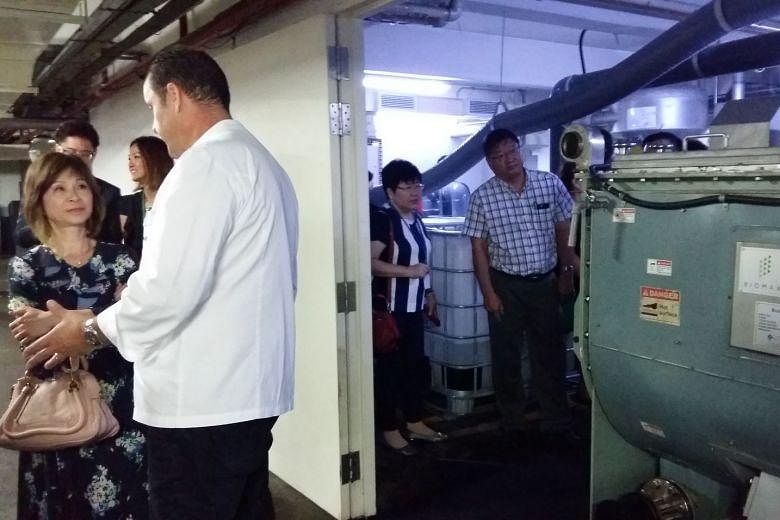Diners at Grand Hyatt Singapore's restaurants have been unknowingly helping the hotel maintain its in-house herb garden every time they have a meal there.
Since mid-2016, the hotel in Scotts Road has been using a food waste management system. Instead of getting thrown away, food waste goes into a machine known as the Biomax Thermophilic Digester.
Food waste such as vegetables, poultry, bones, egg shells, fruit peel - and even tissue paper - from nine in-house restaurants and kitchens are converted into pathogen-free organic fertilisers used in the hotel's rooftop herb garden.
The machine was highlighted as part of a professional sharing session yesterday by Waste Management and Recycling Association of Singapore (WMRAS) and Green Infiniti, the Singapore distributor of Biomax products such as the food waste digester.
About 90 guests attended the session, including Dr Amy Khor, adviser to WMRAS and Senior Minister of State for the Environment and Water Resources and Health.
Said Mr Edwin Pang, executive director of WMRAS: "Only 14 per cent of food waste is recycled, so WMRAS supports efforts to convert food waste into either compost or water for discharge.
"This makes our living environment more sustainable because even if we incinerate food waste, it will produce ash for the Semakau landfill, which will run out of space by 2035 to 2040."
The amount of food waste generated in Singapore has increased by about 40 per cent over the past decade, according to the National Environment Agency.
Recycling food waste has helped Grand Hyatt Singapore to save on food waste haulage fees, operational and manpower expenses, and the cost of trash bags and bins - all of which come up to about $100,000 a year.
Over 24 hours, the hotel can recycle 500kg of food waste.
Mr Chester Chiew, assistant business development manager of slaughterhouse Sinmah Poultry, said he is considering implementing a food waste recycling system.
"We produce a lot of waste because of the chicken parts we throw away, so this waste management technology will generate lots of savings for us.
"Industries with large amounts of animal waste should definitely consider this technology," he said.
Sue-Ann Tan


